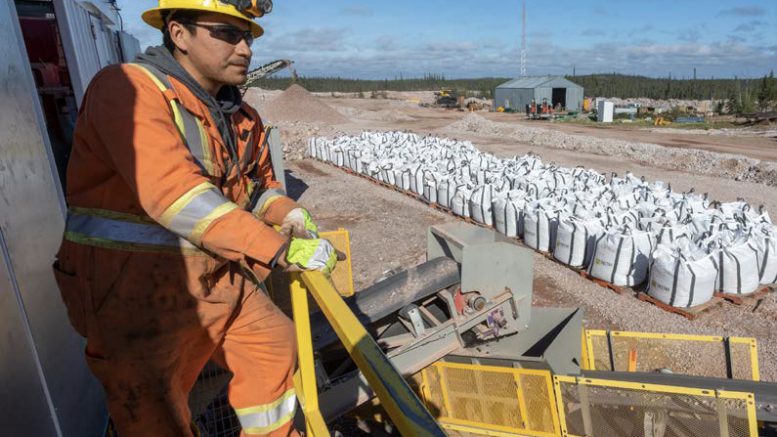Foreign participation in critical minerals projects in Canada raises questions about why Canadians aren’t providing the funding, says the head of the Northwest Territories and Nunavut Chamber of Mines.
A planned sale of stockpiled rare earths mined in the Northwest Territories to a Chinese miner for about A$2.6 million ($2.3 million) shows that too many explorers are struggling to raise money for critical mineral exploration and development, Tom Hoefer, executive director of the chamber, told The Northern Miner on Tuesday.
“That is puzzling given the huge societal demand for minerals to address climate change,” Hoefer said in an emailed response to questions. “China seems able and willing to supply much of that money.”
Vital Metals (ASX: VML) said this week it will sell rare earths from its Nechalacho project, about 110 km southeast of Yellowknife, to Chinese miner Shenghe Resources.
The transaction is part of the sale of 588,917,200 Vital shares to Shenghe for A1¢, or about A$5.9 million, making Shenghe a cornerstone investor and giving it a 9.9% stake in the Australian company. Shenghe also has the right to nominate one person for appointment as a non-executive director to Vital’s board. The share plan had been announced in October.
The first tranche share subscription also comes as Vital on Monday resumed trading on the ASX after a halt in April, amid management changes and a review of its now-shuttered rare earths processing facility in Saskatoon, Sask.
“We are appreciative of the strong vote of support shown by Shenghe in the company’s projects,” Vital chairman Richard Crookes said in a release. “The A$5.9 million in funding provides the company with the capital to continue to progress development of the world class Tardiff deposit.”
Vital said it expects the sale of the stockpile, sourced from its North T deposit at the site to close early next year. It said Shenghe has no preferential rights over future production from Nechalacho. Proceeds will help it complete in 2024 a resource update for Nechalacho, a scoping study for the adjacent Tardiff deposit, reinterpretation of lithium deposits at Nechalacho and permitting studies in the rare earths supply chain.
The rare earths were targeted for processing at the plant in Saskatoon that was under construction by Vital’s Canadian subsidiary Vital Metals Canada (VMCL). After mining started at Nechalacho in 2021, Vital intended to sell processed rare earth carbonate to Norwegian producer REEtec, but plans stalled last year as plant costs doubled and the company deemed the scale of mining at North T uneconomic. Crews halted building when VMCL went bankrupt in September.
Securing supply chains?
The stockpile sale highlights the significance of Nechalacho – Canada’s only demonstration-scale rare earths production project – as Western countries work to secure critical mineral supply chains outside the influence of China. The East Asian country dominates the mining and processing of the 17 rare metals used in cellular phones, computers and magnets for green energy technologies. The only producing rare earths mine in the Americas is MP Materials’ (NYSE: MP) Mountain Pass project in California.
The sale also comes just over one year after the federal government announced a stricter approvals process for transactions by foreign state-owned enterprises in the critical mineral sector.
While on the plus side, Hoefer said the stockpile and share deal will at least allow Vital to continue advancing the project.
“It is good for the N.W.T. and Canada to see that work continuing,” he said.
However, in the bigger picture, the deal points to more questions about Canada’s capacity and management of critical mineral development.
“There are questions we should ask, e.g., ‘Why are we not seeing Canadians investing in these projects? Why is there such a big disconnect between the global demand for critical minerals and the inability of explorers and developers to raise money? What can our governments do to help with their critical mineral goals?’”
Testing the limits
Citing a recent United Kingdom government report that flags the vulnerability of that country’s critical mineral supply chains to dependence on autocracies like China, Hoefer said Canada needs to speak up if its resources are also vulnerable.
He added that it would be helpful if the government could clarify where its boundary sits on foreign participation. Canada showed in 2020 that it couldn’t accept 100% ownership of a project by a Chinese state-owned company, after it blocked Shandong Gold Mining’s bid to take over TMAC Resources and its Hope Bay gold mine in Nunavut.
“Silence suggests that the government is supportive or has no concerns with China’s participation in (Nechalacho). At least at this level of 9.9%.”
Sean Benmor, spokesperson for the Department of Innovation, Science and Economic Development Canada, said in an email that the Investment Canada Act provides for a national security review of any foreign investment into Canada, regardless of the value.
“The confidentiality provisions of the Investment Canada Act mean the government cannot comment on reviews under the act,” he said. “The government has not hesitated and will not hesitate to take action on transactions that would be injurious to Canada’s national security.”
Vital hasn’t specified the grade or weight of the stockpile to be sold to Shenghe. The company had not responded to questions by deadline.
Company shares closed at A0.05¢ on Tuesday, valuing Vital at A$18.5 million.


Be the first to comment on "What can Canada do amid sale of Canadian rare earths to Chinese firm?"